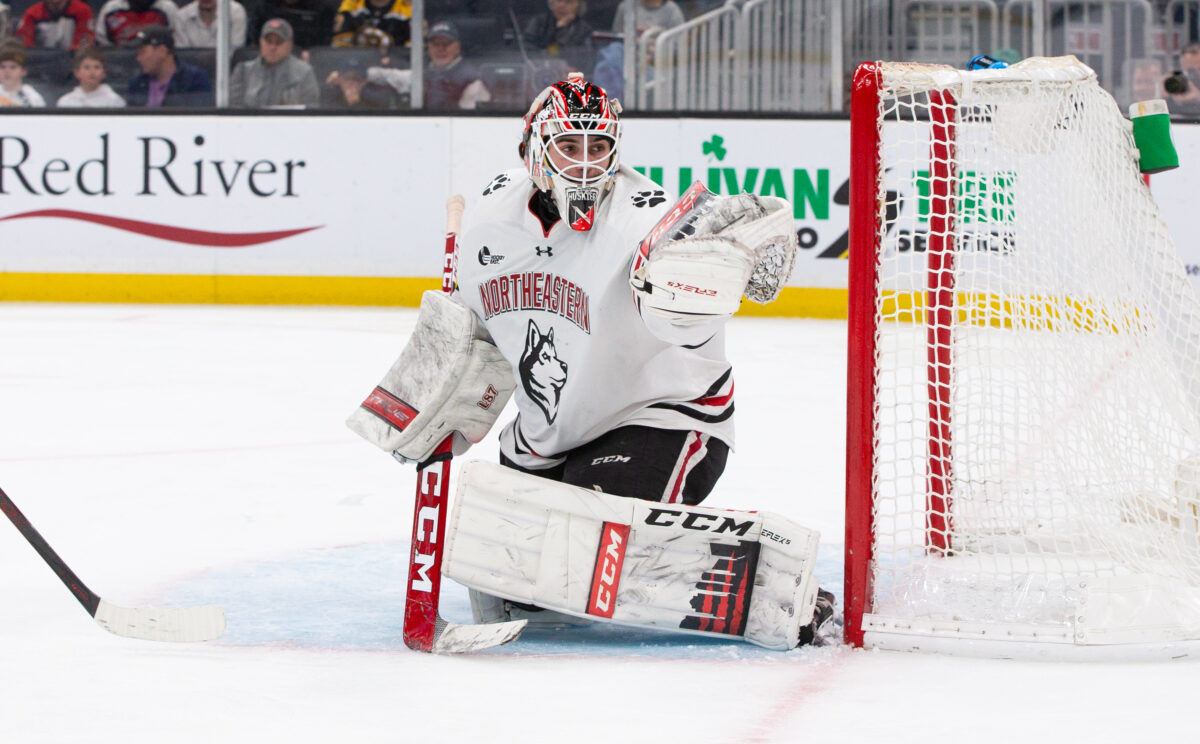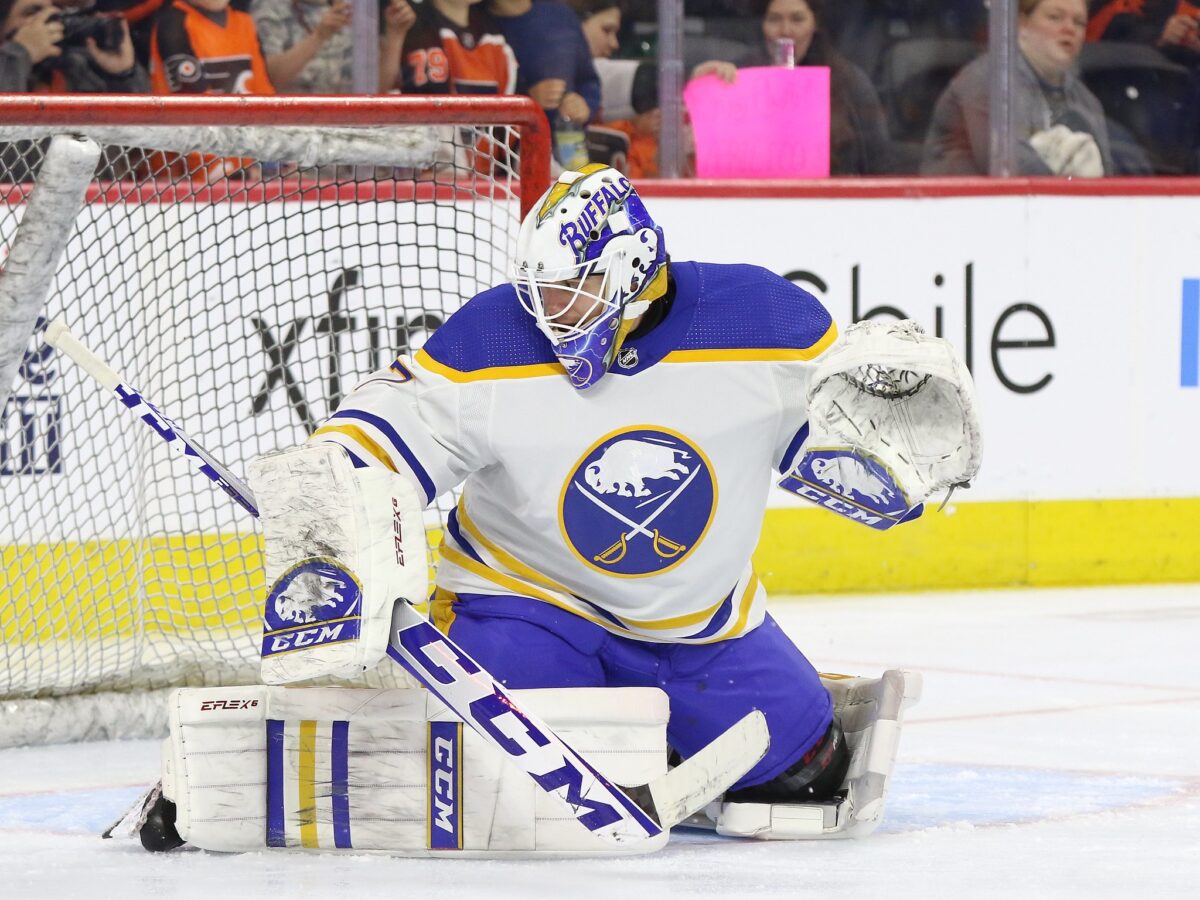In recent history, quality NHL goaltenders have found their footing in the National Collegiate Athletic Association. Ryan Miller, Jonathan Quick, and Connor Hellebuyck are among the most prolific NHLers to develop their game in the NCAA, and now Devon Levi is primed to make that very same jump.
Why Levi Is Exciting
In his very short stint with the Buffalo Sabres last season, Levi proved to be the club’s most talented goaltender, leading the team in goals saved above expected (GSAx), with 3.1 in seven games – league-wide, on a per-60 basis, this would have ranked 14th (with a minimum requirement of seven games).
It’s certainly not unfounded success, either. Levi was one of the most dominant goalies in NCAA history, posting a .942 save percentage (SV%), 1.90 goals-against average (GAA), and 16 shutouts in 66 games over two seasons at Northeastern University. That was also on a porous Northeastern team that allowed the 11th most shots per game of any Division I team last season.
Levi’s most astounding season came in 2021-22 when he put up a .952 SV%, 1.54 GAA, 10 shutouts, and a 21-10-1 record while carrying the Huskies to an NCAA tournament berth – his .952 SV% tied Hellebuyck for the second-highest single-season SV% in NCAA history. Hellebuyck, however, had four inches on Levi and played in front of a much better squad. The same goes for Ryan Miller, who is arguably the NCAA’s greatest goaltender. He also played on a much better team, and despite putting up mind-numbingly impressive numbers, still has a lower career NCAA SV% and ranks fourth for the single-season record.

I’m not saying that Levi is the next Miller or Hellebuyck, but there is reason to expect he will be an effective goaltender at the NHL level solely based on his college dominance, and given his raw talent and statistics, it wouldn’t be a stretch to say that he’ll be elite someday, and perhaps sooner rather than later. However, there are some red flags with that projection.
Causes for Concern
Levi’s size is a legitimate factor in considering his potential success in the NHL. After all, only three goaltenders in the league are listed under 6 feet: Jaroslav Halak, Alex Stalock, and Juuse Saros. Of course, Saros is a top-five goaltender, and Halak has had a long, successful career. With that said, the average goaltender is just under 6-foot-3, and Levi is listed at exactly 6 feet. It doesn’t mean he’ll be a bust, and I’m inclined to believe he’ll land closer to Halak and Saros than Stalock, but his height is a genuine cause for concern.
Related: Atlantic Division Has Gotten More Competitive This Offseason
It’s also uncertain whether he can be a workhorse at the NHL level. He should be anticipated to be the Sabres’ starter next season, but he’s never played more than 41 games in a season, and that was when he combined for 34 NCAA games and seven NHL games last season. In the Sabres’ system, there isn’t much room for him to take a break with only Ukko-Pekka Luukkonen and Eric Comrie behind him in the depth chart. Very often, new goaltenders burn out by the end of the season if they are given a heavy workload, something we saw last season with the New Jersey Devils’ Vitek Vanecek.

Finally, there’s the age factor. It’s not impossible to be successful at a young age, and there are plenty of examples to prove that, but it does mean that Levi has room to grow. Most goalies develop into NHL-caliber talents around 23 or 24 years old, and being that he’s anticipated to be in a starter role next year, it is possible that he’ll suffer some growing pains entering his first full season in the NHL.
What to Expect
While these are concrete causes for concern (with age being only a minor concern), it’s more likely that Levi will turn into a stud than not. Taking into account his upper-echelon talent and comparisons between his dominant NCAA career and other premier college netminders, it wouldn’t be surprising for Levi to steal some games for the Sabres and carry the team to a wild-card berth this season.
If I were to make a prediction based on every factor listed here — good and bad — I’d say that fans should expect an output similar to Hellebuyck’s first full season in the NHL when he played 56 games with a .907 SV% and a 2.89 GAA. The difference is, Buffalo’s team is likely better this season than Winnipeg’s was in 2016-17, so Levi’s statistics might even be slightly better, say .910 SV% and a 2.65 GAA. Sabres fans should be excited to watch their goalie of the future in 2023-24.
